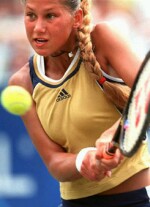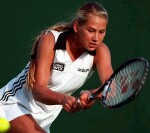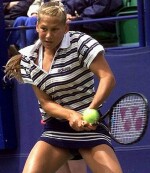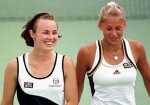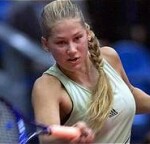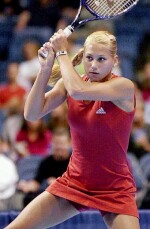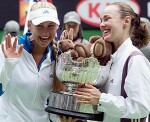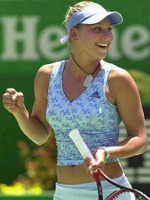1995 ...see also Anna Kournikova 1994-1995 RecordAlthough she had already played in several adult tournament draws, Anna did not officially turn professional until October, 1995, after the Kremlin Cup. In Moscow, She had defeated Belgian Anne Kremer 6-2, 4-6, 6-2 in qualifying to reach the main draw, and defeated German Marketa Kochta 6-4, 3-6, 6-3 in the first round before losing to Sabine Applemans 5-7, 4-6 in the second round. Anna then entered the Vell Challenge in Quebec City, Canada, but lost to Andrea Glass in the 2nd qualifying round.1996 ...see also Anna Kournikova 1996 RecordAnna's first years as a pro were restricted by recent WTA rule changes that limited the number of tournaments that minors could play in. So she played in only 6 WTA events in 1996. In her first Grand Slam appearance, the 1996 US Open, Anna reached the 4th round before she was defeated by Steffi Graf 6-2, 6-1. Anna also appeared in four International Tennis Federation-sanctioned tournaments in 1996, winning two of them, at Midland, Michigan, and at Rockford, Illinois. And in the first Fed Cup "tie" of 1996, she became the youngest player (14) to compete and win in Fed Cup competition, helping Russia defeat Sweden 3-0. Anna began the year ranked 299th. After ending it ranked 56th, she won the 1996 Sanex WTA Tour Most Impressive Newcomer Award.1997 ...see also Anna Kournikova 1997 Record
And in the A&P Classic, a major exhbition tournament, she reached the final before losing to Chanda Rubin 7-6(2), 4-6, 6-7(4). Anna had defeated Chanda at Wimbledon just a few weeks earlier. Other players Anna defeated in 1997 included Amanda Coetzer, Aranxta Sanchez-Vicario, Helena Sukova, and Anke Huber. Anna was ranked 67th at the start of her season when she played in the Australian Open, and reached 27th by October when she played in her 10th WTA tournament of the year in Filderstadt, Germany. 1998 ...see also Anna Kournikova 1998 RecordAnna played in 20 tournaments in 1998, the first year she was no unfettered by WTA age restrictions. In January she took on a regular coach, her first since Nick Bolletieri. This was Pavel Slozil, who had previously coached Steffi Graf (for five years) and Jennifer Capriati.In March Anna played her best tennis yet, when she defeated 4 top ten players in 4 days (Monica Seles, Conchita Martinez, Lindsay Davenport, and Aranxta Sanchez-Vicario) to reach the final of the Lipton Championships in Key Biscayne, FL. Anna lost to Venus Williams in the final 6-2, 4-6, 1-6, the first match they had played together.
Anna was out of action for 2 months, missed Wimbledon, and by the time she returned her rank had dropped back to 15th. She finished the year ranked 13th. Pavel Slozil later said: "It is very difficult to believe that she finished that match against Steffi Graf with that injury. Because she played about 40 more minutes after the injury happened and probably if she would call for a doctor, she would probably quit the match, probably they wouldn't allowed her to play. Once they touch the thumb, that would be a big pain and she would probably default that match. It was unbelievable. She couldn't even touch it after the match. She couldn't move it for one week after she finished -- how she finished that match, it was unbelievable" (Slozil interview). In doubles, Anna won her first WTA title in 1998 at the Princess Cup in Tokyo, partnered with Monica Seles. They defeated Mary Joe Fernandez and Aranxta Sanchez-Vicario 6-4, 6-4, on September 27. 1999 ...see also Anna Kournikova 1999 RecordAnna began 1999 ranked 13th in singles, and finished it 12th, as she reached 3 quarterfinals, 3 semifinals, and a final.
Anna and Martina won five doubles titles in 1999, adding Indian Wells, the Italian Open, Eastbourne, and the WTA Championships. They were declared ITF World Doubles Champions, and Anna finished the year the #1 ranked doubles player in the WTA. In April, Anna reached her 2nd tour singles final in a major tournament, the Family Circle Cup at Hilton Head, SC, where she lost to Hingis 4-6, 3-6. The following week, Anna defeated Jennifer Capriati, Lindsay Davenport, and Patty Schnyder at the Bausch & Lomb in Amelia Island, SC, before losing to Ruxandra Dragomir in a semifinal. Anna also defeated Chanda Rubin, Mary Joe Fernandez, and Sandrine Testud in 1999. Unfortunately Anna also suffered another major injury that year, a stress fracture of her right foot that kept her out of action from early August until late October, causing her to miss the US Open. 2000 ...see also Anna Kournikova 2000 RecordAnna stepped her game up a notch in 2000, reaching one final, eight semifinals, and seven quarterfinals in 26 WTA tournaments.
In doubles, Anna had a great year playing with a variety of partners. Anna won 6 doubles titles in 2000: the Gold Coast with Julie Halard-Decugis, Hamburg with Natasha Zvereva, and Filderstadt, Zurich, Philadelphia, and the WTA Championships with Martina Hingis. At the Australian Open she reached the semifinals with Barbara Schett, and the mixed semifinals with Jonas Bjorkman. At Wimbledon, Anna again reached the semifinals playing with Zvereva. And at the US Open, she reached the mixed doubles final partnered with Max Mirnyi. In December, an argument at an exhibition in Chile led Hingis to decide to seek a different doubles partner for a while, but they would mend their differences and be playing together again in less than a year. Eric Van Harpen had replaced Pavel Slozil as Anna's coach in late 1999. As Tennis magazine writer Peter Bodo put it, Van Harpen's "technical expertise clearly exceeds his people skills," and after 10 months of conflict with her coach, Anna dismissed Van Harpen in July at the A&P Classic exhibition, complaining "You always tell me what I do wrong, not what I should do to make it right." Van Harpen took revenge with a mud-slinging interview in the German magazine Der Spiegel. Van Harpen made a number of derogatory personal remarks, and said: "She has sufficient talent to be in the world's top five and stay there for a long time. But she doesn't do everything she can to get there. She's not disciplined enough in her work." After this Anna relied on her parents as coaches until 2002. 1 2001 ...see also Anna Kournikova 2001 Record
Anna's most troublesome injury to date kept her out of action until the Acura Classic at the end of July, when reinjury of the foot put her back on the sidelines until late September. Anna seemed slow to find her game after the injury. She lost five straight singles matches, and her ranking dropped to 22nd before she reached the quarterfinals of the Seat Open in October. In exhibitions at the end of the year, Anna seemed to be back on track, winning three out of four matches against Amanda Coetzer, and also defeating Jennifer Capriati. In doubles, Anna teamed with Barbara Schett in January to win the adidas International in Sydney, defeating Lisa Raymond and Rennae Stubbs 6-2, 7-5. Anna and Barbara then reached the quarterfinals of the Australian Open before losing to the Williams sisters 6-3, 1-6, 1-6. Anna then partnered with Iroda Tulyaganova at the Pan Pacific Open, reaching the final, where they lost to #1 pair Raymond and Stubbs. After Anna returned from her injury layoff, she teamed up with Martina Hingis again, and they reached a semifinal and two finals, winning the Kremlin Cup doubles. 2002 ...see also Anna Kournikova 2002 RecordAt the start of 2002, Anna's ranking had fallen from 22nd, at her last WTA event, in October, 2001, to 71st. This resulted primarily from Anna having not played enough tournaments (the best 17 tournament results from the past 52 weeks are combined to determine rankings). Anna's rank would drop to 100 at the end of January before it rose again. Anna had some success early in the year, reaching three semifinals at Auckland, Tokyo, and Acapulco, and by June had raised her ranking to 54th. But Anna was ousted in the first round of the Australian Open by Justine Henin, and after Acapulco suffered eight first round losses in her next ten events, the worst slump in her career. Anna was troubled by a variety of minor injuries during this period, but this was not the only problem. So Anna, who had been coached by her parents and a variety of temporary practice partners (such as Mario Tudor) since July, 1999, hired Harold Solomon as her regular coach in mid-May after the Italian Open. Solomon had earned a reputation for helping talented players (such as Mary Joe Fernandez and Jennifer Capriati) fully utilize their potential abilities.In late July, Anna began to show much stonger play, reaching the quarterfinals of the Bank of the West Classic before losing to #2 Venus Williams, and the semifinals of the Acura Classic, before losing a very close match in which she had 2 match points to #5 Jelena Dokic. "Her focus was right there and her concentration has improved 100 percent," coach Solomon said about those events. "Her fight on the court has been great." Two weeks before the US Open, Anna's rank had recovered to #40. She was eliminated in the 1st round at the US Open, but later in September Anna reached the 4th WTA singles final of her career at the Polo Open in Shanghai, China, losing to Anna Smashnova (Anna K won her 16th doubles title the same day). Unfortunately, on Oct. 2 at the Kremlin Cup in Moscow, Anna tore a ligament in her left ankle, which ended her 2002 WTA season. Anna's WTA ranking was #35 at the end of the year. Anna recovered to play 4 exhibitions in December. In 3 matches against #7 Monica Seles, Anna won 33 games to Monica's 35, and Anna won her last match of 2002, defeating Monica in Winnipeg 6-4, 7-5.10
At Eastbourne, Anna teamed up with Chanda Rubin for the first time, and at Wimbledon Anna and Chanda defeated #1 Raymond and Stubbs to reach the semifinals before losing to the Williams sisters 7-6(3), 0-6, 3-6. Anna also reached the quarterfinals in mixed doubles at Wimbledon in 2002, partnered with Jonas Bjorkman. By the US Open, Martina Hingis had (temporarily) returned to action, and she and Anna reached the quarters in doubles there. Later in September, at the Polo Open in Shanghai, China, Anna won the 16th doubles title of her career, partnered with Janet Lee of Taiwan for the first time. But while playing doubles at the Kremlin Cup on October 2nd (partnered with Meghann Shaughnessy), Anna sprained her left ankle tearing a ligament, and her 2002 WTA season was over. Comments about Anna Kournikova's 2002 slump: Question: ...do you believe she [Anna] can get to the Top 10 again? "Well, she definitely has the game. She has the strokes. You know, sometimes she rushes a little bit too much. I mean, she was able to beat Top-10 players in the past. She beat me once. She beat Lindsay. She beat other ones. She made the finals of Key Biscayne and Hilton Head. She's had the game. Semis Wimbledon, right. She's still young, too. She's even younger than me." -- Martina Hingis, March 2002 "I feel Kournikova would give herself a better shot at winning in singles by working on her serve. More success with her serve would help bring up her confidence, which I believe to be pretty low when she is playing singles." -- John McEnroe, July 2002 "I think Kournikova can improve her forehand. She winds up a little too much, meaning that she needs to shorten her swing a little bit more and come underneath the ball. If you watch Kournikova hit her forehand, you’ll notice that she hits it a little too far away from her body. She does that with her backhand too, but there I think she can get away with it because she hits her backhand with two hands." -- Chris Evert, July 2002 "Anna is definitely going through a difficult period. I think she'll get through it. She's a very strong personality... She had a tough injury... But I've seen she's practicing really hard. She's out there many hours hitting the ball. She has a great coach in Harold [Solomon]. I think she has the right ingredients. Hopefully that will pay off for her." -- Monica Seles, July 2002 "We're practicing six hours a day. She's a trouper." -- Harold Solomon, July 2002 "I'm not concerned about whether she's going to win tournaments. I know she'll win tournaments. I think she can definitely be a top-10 player again (she was No.8 in 2000 and 2001). That would be my expectation for her. I'd be disappointed if she didn't end up back in the top 10 over the next year and a half." -- Harold Solomon, August 2002 10 2003 ...see also Anna Kournikova 2003 RecordIt was not Anna's first experience with back pain. During the post-match interview after her 1st round win at the Australian Open, reporters badgered Anna about rumors she had a tattoo on her back, covered up with a patch. Anna replied: "I've been wearing a heat patch for about two years now. It just happens to be that my skirt is pretty low right now, and everybody sees the patch... I don't think I have anything on my body. I just have a heat patch. I have a chronic back pain, I'm sorry." Anna withdrew from all tourneys until the NASDAQ-100 Open in March, which is essentially her home tourney. There and at Sarasota, Anna fell in the 1st round, then at the Family Circle Cup at Charleston Anna tore a thigh muscle while playing Conchita Martinez. After another injury month off, Anna tried to get more real match time by playing in a couple of ITF tourneys, but again she struggled with an injury withdrawal and injury-related 1st round loss. Anna went to Birmingham, England, to compete in the pre-Wimbledon DFS Classic in in June, and aggravated a chronic lumbar (low back) injury while practicing with coach Harold Solomon there. Anna was very upset with having to withdraw from another tourney at the last minute, and she decided to stay away from the WTA Tour until she could rehabilitate her back enough to play regulary. Despite the injury, Anna has been capable of playing an occasional exhibition (she played at 3 in late 2003, including a victory over Tamarine Tanasugarn) or World Team Tennis match (Anna did very well in WTT doubles in July). But she has been unable to tolerate the daily grind of the WTA Tour. In early 2004 Anna said that she hoped to return to the Tour by mid-year, but it was not to be. Anna ended her employment of coach Harold Solomon in late 2003, because she was not expecting to return to the WTA Tour until mid-2004 (Solomon now coaches Daniela Hantuchova). The Kournikova Game-- Anna Kournikova is strong all-around.-- She is a great net player, with a solid forehand and an excellent two-handed backhand. -- She hits the ball hard, although not as hard as the hardest-hitting players. -- Anna's serve is the weakest part of her game, particularly her second serve, and she has had problems with streaks of large numbers of double faults. At Wimbledon in 2002 she served at up to 104 MPH, and finished one doubles match with a service winner and an ace, but she has not been able to serve this way consistently, a problem that affects many players. -- Troubles with her serve reduce Anna's chances of going to the net, where she is very strong. -- Anna plays tennis very aggressively, and win or lose the statistics will often show her hitting more of both winners and unforced errors than her opponent. Comments about Anna Kournikova's tennis skills: Question: Can she be as good as Steffi...? "I don't think anybody can win 21 Grand Slam tournaments anymore. But I hope she can win -- she is good on every surface. She can play very well on grass, very well. I think it is the best surface, probably. Hard courts, she is playing very well. Look at Lipton, on clay she beat the best clay court players, Hingis, Majoli, Sanchez already twice on clay. So, indoor she has to learn something about indoor tennis and she is fine, she is going to be fine. Step after step." -- Pavel Slozil, August, 1998 "Anna just needs to cut back on her errors, to play with more discipline and patience." -- Eric Van Harpen 1 "She has a solid all-round game. She can do anything. She can come to the net and she can be aggressive from the baseline... I rate her as a potential grand slam singles champion. She has an amazing game." -- Amanda Coetzer, October, 2001 -- "...you like to work with people that have ability and with people that really want to work -- and Anna does. She's one of the most talented girls in terms of doing different things with the ball -- slice, drop shots, topspin lobs and playing at the net. And she's very quick on her feet. She has all those assets and generates an enormous amount of power for a girl who's not that big." -- Harold Solomon 10 Previous: 1. The Early Years Next: 3. Anna Offcourt |
References: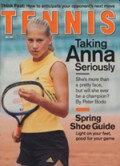 The Player by Peter Bodo Tennis Magazine May, 2001 2: Interview by Richard Calpin FHM Sept. 2001 3: Kournikova, Anna by Patrick Kelly Current Biography Jan. 2002 p. 74 4: New York Times April 23, 1992 B, p. 13 5: Player Profile: Anna Kournikova at WTATour.com 6: Interview Inside Sport December, 1999 7: Interview Hola Magazine August 24th, 1999 8: Interview Sunday Herald June 23, 2002 9: Interview by Matthew Cronin tennisreporters.net July 26, 2002 10: Interview with Harold Solomon Toronto Globe-Mail August 14, 2002 Anna Kournikova Post-Match Interviews at QuickSports Other Sources: 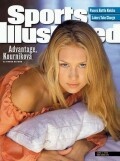 June 6, 2000  August, 1999 |
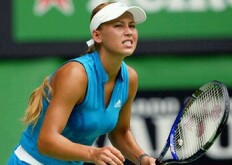
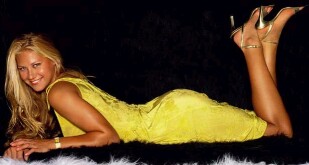
Anna Kournikova pages at quickfound.net:
- Anna Kournikova Biography:
1. The Early Years 2. Professional Career 3. Anna Offcourt - News and Links (Kournikova Home)
- Anna Kournikova News Archive
- Anna Kournikova Record: 2002 2001 2000 1999 1998 1997 1996 1994-1995
- Kournikova 2002 Doubles Record
- Kournikova Interviews Archive
- Anna Kournikova 2002 Australian Open Photos
- Anna Kournikova Photos and Posters (4 pages)
Find tennis shoes made by: adidas -- Nike -- Fila -- Reebok
Find tennis racquets made by: Yonex -- Wilson -- Head -- Prince -- Babolat
Find tennis balls made by: Wilson -- Dunlop -- Penn -- Tretorn -- Slazenger
This page's URL is: http://sports.quickfound.net/anna_kournikova_career.html
Find tennis racquets made by: Yonex -- Wilson -- Head -- Prince -- Babolat
Find tennis balls made by: Wilson -- Dunlop -- Penn -- Tretorn -- Slazenger
This page's URL is: http://sports.quickfound.net/anna_kournikova_career.html
